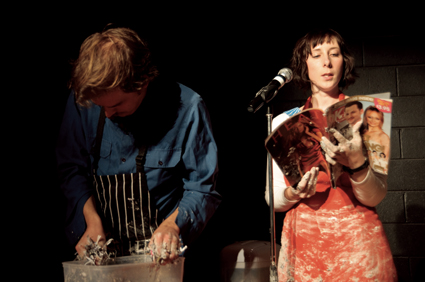labours of love
david williams: whittaker & caesar, starfuckers

Malcolm Whittaker and Laura Caesar, Starfuckers
photo Lucy Parakhina
Malcolm Whittaker and Laura Caesar, Starfuckers
FOLLOWING IN THE TRADITION OF FAMOUS ARTIST COUPLES SUCH AS MARINA ABRAMOVIC AND ULAY, PERFORMANCE MAKER MALCOLM WHITTAKER AND HIS PARTNER LAURA CAESAR, BILLED AS A “PRIMARY SCHOOL TEACHER AND ARTS AND CRAFTS ENTHUSIAST,” DEVELOPED AND PERFORMED THE DURATIONAL PERFORMANCE STARFUCKERS. WHITTAKER AND CAESAR’S SUBURBAN NARRATIVE LANDSCAPES OFFER A SIGNIFICANTLY MORE INTIMATE IF LOWER-KEY PERFORMANCE TO ABRAMOVIC AND ULAY’S BREAK-UP EVENT, GREAT WALL WALK (1989).
One at a time, our partners in love and art step up to a microphone and read out a story. Some are diary entries written during the making of the project, and some are personal relationship memories. Each of these stories has been printed out and inserted into a magazine—Woman’s Weekly, Who, New Idea—torn out after they have been read and put immediately through a shredder. At the other end of the room, the detritus of these pedestrian love stories with their glossy celebrity underlay is transformed into papier-mache, moulded into figurines and baked in a small oven. Wearing aprons, the performers take turns to read, share and deliver the shreddings to be glue-soaked and flour-covered, shaped, baked and finally displayed in an ever-multiplying tableau across a long red-covered table. The small studio seems overly warm, filled with the crisp smell of baking paper, and over the hours a small army of tiny figures—effigies of the performers themselves?—gradually populates the long central table, filling up the space previously occupied by language alone.
Over the three hours of the performance, these accumulations form a strangely unsentimental love-crafting, the product of an idiosyncratic confessional cottage industry. Against the saccharine celebrity romance sagas of the gossip magazines, Caesar and Whittaker insert their more prosaic relationship perspectives, and do so in a gently self-deprecating way. As they note: “We hope we are interesting enough, beautiful enough, enough of enough.”
Whittaker first met Caesar when she took pity on him while he was tied to a tree at a scout camp, the victim of some gleefully cruel practical joke. It was clearly destiny, of a kind. An image of George Clooney’s face is shredded after Caesar details her perspective on a night in which the couple stayed at the apartment of a meth-smoking stranger “with crazy eyes.” In Whittaker’s version of events, everything was fine, no one was ever in danger and sleeping on the floor of a stranger whom the couple only met that evening was a perfectly normal thing to do. In Caesar’s story, she doesn’t sleep a wink, remaining alert and highly alarmed. Whittaker was tired, so he slept, and everything ended up alright, and so from his perspective there never was any problem.
Rarely do the lovers offer the same perspective on any given event, and the process of this diarising itself inflects the relationship. “I worry that my art practice is interfering with my personal life,” states Whittaker, observing ruefully that perhaps their almost non-existent sex life at the time of writing was due to the fact that Caesar doesn’t wish sexual intercourse to appear in their journal. At another moment, Caesar reads an entry in which she informs Whittaker that her current course of antibiotics makes her contraceptive pill ineffective, meaning that there won’t be any sex unless he buys “something else.” But he won’t. They both know and accept that he is just too cheap.
Our lovers tell their audience of perceived petty grievances, anxieties and affections. All of the stories provoke moments of recognition—I’ve been to these places before, though (I tell myself hopefully) not with quite Whittaker’s often-uncomfortable level of too-honest hubris. The diary entries and other writings detail uncertainties, mild confusions, potential infidelities and a great many misunderstandings. Despite these regular romantic imperfections, our lovers map out their past and gently imagine a shared future, even if its exact terms might always remain a point of contention.
Starfuckers is a product of Merrigong Theatre Company’s new Independent Producers Program, a welcome initiative recognising the growing number of significantly promising contemporary performance makers currently emerging through the University of Wollongong’s performing arts course, of which Whittaker is a graduate. I hope that this program continues to offer opportunities to facilitate such deeply engaging experiments as Starfuckers.
Starfuckers, creators, performers Laura Caesar, Malcolm Whittaker, Merrigong Theatre Company Independent Producers Program, Bob Peet Studio, Illawarra Performing Arts Centre, July 23-24
RealTime issue #99 Oct-Nov 2010 pg. 40






